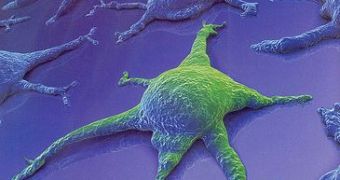We all heard of stem cells and all the good they can do to body tissue, but a new research from Rockefeller University shows that having too many stem cells, or cells that live for too long, can cause cancer.
The researchers got to this conclusion after finding a mechanism that regulates programmed cell death in precursor cells for blood – hematopoietic stem cells, and discovered that if the cells do not die as they should, the risk of developing tumors later on in mice, increases.
The scientists involved in this discovery are research associate Maria Garcia-Fernandez, Hermann Steller, head of the Strang Laboratory of Apoptosis and Cancer Biology, and their colleagues.
They studied the activity of a gene called Sept4, that encodes a protein – ARTS, which enhances programmed cell death (apoptosis), by countering the proteins that prevent cell death.
The ARTS protein was first discovered by Sarit Larisch, a visiting professor at Rockefeller, and cells that lacked it were studied for many years by Garcia-Fernandez.
ARTS does not exist in people suffering from leukemia and other cancers, and researchers supposed this happens because it suppresses tumors.
So they bred a line of genetically engineered mice, that lacked the Sept4 gene, and Garcia-Fernandez looked for evidence related to cell death.
She did not find anything in mature B and T cells so she looked earlier in cell evolution and finally reached the hematopoietic progenitor and stem cells, where she found important differences.
Newborn engineered mice had twice as many hematopoietic stem cells than they should, and these stem cells had a huge capacity of surviving mutations.
Garcia-Fernandez said that “the increase in the number of hematopoietic progenitor and stem cells in Sept4-deficient mice brings with it the possibility of accelerating the accumulation of mutations in stem cells.
“They have more stem cells with enhanced resistance to apoptosis; in the end, that leads to more cells accumulating mutations that cannot be eliminated.”
As a result, the ARTS-deprived mice developed sudden tumors, twice as fast as the control group.
Hermann Steller said that the study made “a connection between apoptosis, stem cells and cancer that has not been made in this way before: this pathway is critically important in stem cell death and in reducing tumor risk.
“The work supports the idea that the stem cell is the seed of the tumor and that the transition from a normal stem cell to a cancer stem cell involves increased resistance to apoptosis.”
The research is to be published today in Genes and Development.

 14 DAY TRIAL //
14 DAY TRIAL //